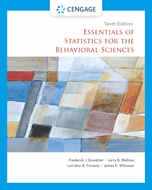Solution Found!
Reaction Times in Anderson's Study: Analyzing Central Tendencies
Chapter 3, Problem 30(choose chapter or problem)
Anderson (1999) was interested in the effects of attention load on reaction time. Participants in her study received a dual-task procedure in which they needed to respond as quickly as possible to a stimulus while simultaneously paying attention to the sounds of spoken words. She recorded reaction time (in hundreds of milliseconds). Below are data like those observed by Anderson:
\(3, 4, 4, 4, 5, 6, 8, 12, 20, 25\)
a. Find the mean, median, and mode.
b. Based on the relative values of those statistics, what is the shape of the distribution?
c. Anderson (1999) reported median reaction times. Why?
Questions & Answers
QUESTION:
Anderson (1999) was interested in the effects of attention load on reaction time. Participants in her study received a dual-task procedure in which they needed to respond as quickly as possible to a stimulus while simultaneously paying attention to the sounds of spoken words. She recorded reaction time (in hundreds of milliseconds). Below are data like those observed by Anderson:
\(3, 4, 4, 4, 5, 6, 8, 12, 20, 25\)
a. Find the mean, median, and mode.
b. Based on the relative values of those statistics, what is the shape of the distribution?
c. Anderson (1999) reported median reaction times. Why?
ANSWER:Step 1 of 4
Given:
The data for the reaction time (in hundreds of milliseconds) for paying attention to the sounds of spoken words is provided as,
3, 4, 4, 4, 5, 6, 8, 12, 20, 25
Watch The Answer!
Reaction Times in Anderson's Study: Analyzing Central Tendencies
Want To Learn More? To watch the entire video and ALL of the videos in the series:
Explore Anderson's 1999 study on how attention load impacts reaction times. Through hands-on analysis, understand the computation of mean, median, and mode from the provided data. Highlighting the significance of the median in capturing the central tendency amidst potential outliers.
